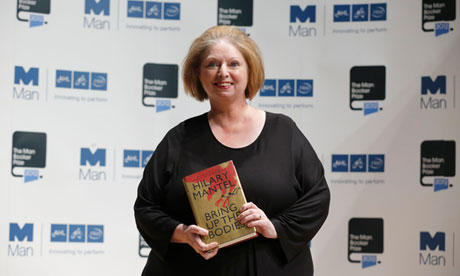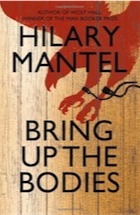
Hilary Mantel has won her second Man Booker prize for Bring Up the Bodies, the sequel to the remarkably successful Wolf Hall. Photograph: Justin Tallis/AFP/Getty
This is an unprecedented year for the Man Booker. Not only does Hilary Mantel become the first British novelist and the first woman to win the prize twice, she is also the first writer to win double glory with a sequel. Bring Up the Bodies is a continuation, in effect, of the literary project that began with Wolf Hall but expanded to become a promised trilogy: the rehabilitation of Thomas Cromwell, fixer and eventual victim of Henry VIII's break with Rome, and the reimagining of the Tudor period in thrillingly close focus and startlingly immediate prose.
 This volume follows the downfall and execution of Anne Boleyn, in scenes that become ever more taut as the scaffold approaches. We may know the outcome, but Cromwell does not; Mantel's genius, as she inhabits Cromwell's consciousness in an urgent present tense, is to animate history in all its contingency and peril. The character of Anne, her mutability and ultimate unknowability, raises fertile questions about fiction and representation, while no one who reads the scenes of interrogation and torture, forced into uneasy sympathy with the affable Cromwell's chilling realpolitik, can consider historical fiction irrelevant to our own times.
This volume follows the downfall and execution of Anne Boleyn, in scenes that become ever more taut as the scaffold approaches. We may know the outcome, but Cromwell does not; Mantel's genius, as she inhabits Cromwell's consciousness in an urgent present tense, is to animate history in all its contingency and peril. The character of Anne, her mutability and ultimate unknowability, raises fertile questions about fiction and representation, while no one who reads the scenes of interrogation and torture, forced into uneasy sympathy with the affable Cromwell's chilling realpolitik, can consider historical fiction irrelevant to our own times.
But is the awarding of the prize a second time to what is essentially volume two in one very long book a missed opportunity? The judges had already noted "her even greater mastery of the method", so in some ways it makes sense to set a double crown on our most brilliant English writer, brought into the spotlight by her first Booker in 2009.
Her previous novels would have made worthy winners, too, especially her French Revolution epic A Place of Greater Safety, which does for Paris in the 1790s what Wolf Hall and Bring Up the Bodies do for the Tudor era, or Beyond Black, an extraordinary novel about lost souls and psychic pain set on the margins of modern Britain and the spirit world, which is indeed outlandishly dark. One of the happy results of her first Booker win was a 900% boost in sales for her backlist.
Indeed, Wolf Hall became the fastest-selling winner in the prize's history: a happy marriage of literary quality and popular approval. Mantel is a singular, uncompromising writer, but her current subject matter – high intrigue and low cunning at the Tudor court – happens to have wide appeal.
The other novels on the shortlist could never be so popular. Deborah Levy's Freudian tale of madness among the middle classes, Jeet Thayil's brilliantly rambling stories of druggy Bombay, Tan Twan Eng's exploration of atrocity and artistry, Alison Moore's slow-burning portrait of a man in flight from his past: Mantel's is, literally and metaphorically, a weightier book than these.
But Mantel's real challenger on the shortlist, and the novel that has missed out to her double coronation, must have been Will Self's Umbrella. An undeniably daunting slab of high modernist prose, without such concessions as speech marks or paragraph breaks, it's also a brilliantly absorbing and audacious meditation on madness, consciousness, technology, war and the mess of the 20th century.
As a highbrow panel dropped the previous year's demands for "readability" in favour of complexity and the sheer pleasures of innovative prose, it looked for a while as though it could have been Self's year. As it is, perhaps Umbrella would have been too radical a choice for a prize that, as the country's biggest, cannot help but be a little conservative.
And so the judges have rewarded a popular and brilliant book – again – and left a poisoned chalice for whoever is on the panel when the third part of Mantel's trilogy comes out.
 This volume follows the downfall and execution of Anne Boleyn, in scenes that become ever more taut as the scaffold approaches. We may know the outcome, but Cromwell does not; Mantel's genius, as she inhabits Cromwell's consciousness in an urgent present tense, is to animate history in all its contingency and peril. The character of Anne, her mutability and ultimate unknowability, raises fertile questions about fiction and representation, while no one who reads the scenes of interrogation and torture, forced into uneasy sympathy with the affable Cromwell's chilling realpolitik, can consider historical fiction irrelevant to our own times.
This volume follows the downfall and execution of Anne Boleyn, in scenes that become ever more taut as the scaffold approaches. We may know the outcome, but Cromwell does not; Mantel's genius, as she inhabits Cromwell's consciousness in an urgent present tense, is to animate history in all its contingency and peril. The character of Anne, her mutability and ultimate unknowability, raises fertile questions about fiction and representation, while no one who reads the scenes of interrogation and torture, forced into uneasy sympathy with the affable Cromwell's chilling realpolitik, can consider historical fiction irrelevant to our own times.But is the awarding of the prize a second time to what is essentially volume two in one very long book a missed opportunity? The judges had already noted "her even greater mastery of the method", so in some ways it makes sense to set a double crown on our most brilliant English writer, brought into the spotlight by her first Booker in 2009.
Her previous novels would have made worthy winners, too, especially her French Revolution epic A Place of Greater Safety, which does for Paris in the 1790s what Wolf Hall and Bring Up the Bodies do for the Tudor era, or Beyond Black, an extraordinary novel about lost souls and psychic pain set on the margins of modern Britain and the spirit world, which is indeed outlandishly dark. One of the happy results of her first Booker win was a 900% boost in sales for her backlist.
Indeed, Wolf Hall became the fastest-selling winner in the prize's history: a happy marriage of literary quality and popular approval. Mantel is a singular, uncompromising writer, but her current subject matter – high intrigue and low cunning at the Tudor court – happens to have wide appeal.
The other novels on the shortlist could never be so popular. Deborah Levy's Freudian tale of madness among the middle classes, Jeet Thayil's brilliantly rambling stories of druggy Bombay, Tan Twan Eng's exploration of atrocity and artistry, Alison Moore's slow-burning portrait of a man in flight from his past: Mantel's is, literally and metaphorically, a weightier book than these.
But Mantel's real challenger on the shortlist, and the novel that has missed out to her double coronation, must have been Will Self's Umbrella. An undeniably daunting slab of high modernist prose, without such concessions as speech marks or paragraph breaks, it's also a brilliantly absorbing and audacious meditation on madness, consciousness, technology, war and the mess of the 20th century.
As a highbrow panel dropped the previous year's demands for "readability" in favour of complexity and the sheer pleasures of innovative prose, it looked for a while as though it could have been Self's year. As it is, perhaps Umbrella would have been too radical a choice for a prize that, as the country's biggest, cannot help but be a little conservative.
And so the judges have rewarded a popular and brilliant book – again – and left a poisoned chalice for whoever is on the panel when the third part of Mantel's trilogy comes out.
No comments:
Post a Comment